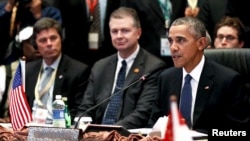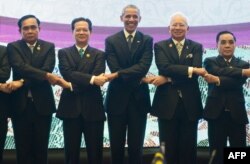The United States has strengthened ties with the Association of Southeast Asian Nations (ASEAN), which President Barack Obama said should play a leadership role in the region in the years ahead.
“I’ve deepened America’s cooperation with ASEAN because a united, integrated and effective ASEAN in the center of Asia is a force of stability, prosperity and peace,” Obama said in Kuala Lumpur Saturday.
In a joint statement, the White House and ASEAN leaders said they “elevated” their relationship to the ASEAN-U.S. Strategic Partnership with a common goal of creating a peaceful and prosperous Asia-Pacific region.
'Rule-based order'
Obama said ASEAN plays a vital role in advancing a “rules-based order” in the Asia-Pacific and their new partnership will guide their relationship for “decades to come.”
He encouraged ASEAN's plan to establish an international code of conduct for the South China Sea, the subject of many territorial disputes in recent months involving China and other countries in the region.
The association discussed a code of conduct with China more than a decade ago, but that never had binding authority on the parties involved.
ASEAN's newly announced plan would establish international laws and norms for the peaceful resolution of disputes, including questions about freedom of navigation and freedom of overflight.
The White House has repeatedly said establishing a “rule-based order” for the South China Sea, which carries a large portion of the entire world's maritime freight traffic, is critical to regional security and economic prosperity, both cornerstones of U.S. policy on the Asia-Pacific.
Regional tensions
China’s territorial claims in the South China Sea have raised tensions with surrounding countries.
Beijing has been conducting dredging projects on seven disputed formations for nearly two years, creating artificial mini islands. Two of those newly formed islands have airstrips and harbors that can handle military air and sea craft.
Surrounding countries are suspicious about Beijing’s intentions.
“For the sake of regional stability, claimants should halt reclamation, new construction, and militarization of disputed areas,” Obama said.
Earlier, Indian Prime Minister Narendra Modi expressed hope for “early adoption of a code of conduct on the basis of consensus” and called on parties involved in the South China Sea dispute to abide by the guidelines that are implemented.
On the new ASEAN-U.S. Strategic Partnership, the White House outlined five priority areas of engagement.
They include increased economic cooperation, expanded maritime cooperation, working jointly on transnational issues such as terrorism, cyber security and climate change, as well as the development of emerging leaders and opportunities for women.





